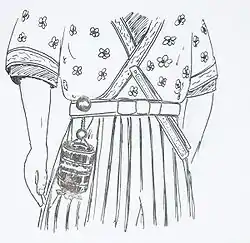印籠
Japanese
| Kanji in this term | |
|---|---|
| 印 | 籠 |
| いん Grade: 4 |
ろう Grade: S |
| kan’on | |
Etymology
Appears to be a Japanese coinage from Middle Chinese-derived roots, as a compound of 印 (in, “seal, stamp”) + 籠 (rō, “basket; container”). Appears in texts from the late 1600s.[1]
Pronunciation
Noun
References
- Shōgaku Tosho (1988) 国語大辞典(新装版) [Unabridged Dictionary of Japanese (Revised Edition)] (in Japanese), Tōkyō: Shogakukan, →ISBN
- Matsumura, Akira, editor (2006), 大辞林 [Daijirin] (in Japanese), Third edition, Tōkyō: Sanseidō, →ISBN
This article is issued from Wiktionary. The text is licensed under Creative Commons - Attribution - Sharealike. Additional terms may apply for the media files.
